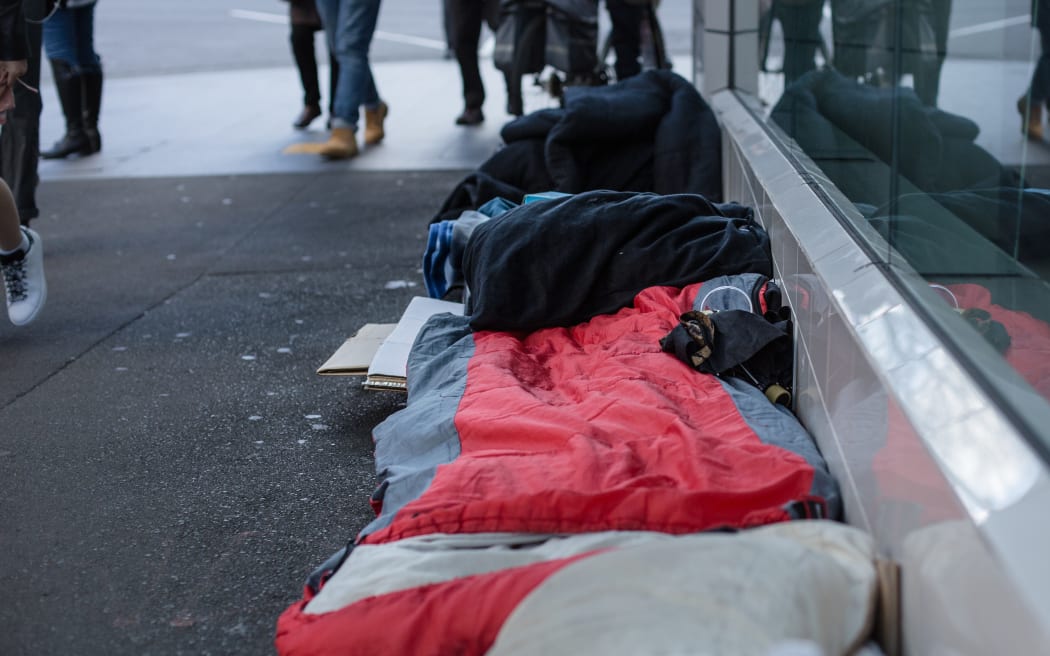
Auckland City Council says it is addressing homelessness in the central city. Photo: RNZ / Luke McPake
Police in Auckland say they're focused on ensuring people feel safe coming into the city, as they address crime and homelessness in the central city.
Auckland Council's Safety and Regulatory Committee heard a report from authorities earlier this month, with an update on their goals to work with the community to make the city safer.
Some of those who appeared to be homeless are not, police said.
Area commander Inspector Grant Tetzlaff told council they distinguish between homeless people and 'hustlers', a term used by other agencies for those who have somewhere to stay and but are still out asking members of the community for money.
In a statement to RNZ, Tetzlaff said addressing housing, health, and issues with addiction would decrease the homeless population, and anti-social activity in town.
"Being homeless is not a crime in and of itself," he said. "It is a social problem which requires a joint effort to address the underlying issues.
"Police work with a number of agencies to support them in addressing these issues."
Officers were going out into the community from a patrol base on Federal Street and from the Auckland City Police Hub, Tetzlaff said.
And data showed a reduction in crime in the central city.
"While our analysis has shown crime levels have been easing off in recent months, there is still a perception that anti-social and nuisance behaviour is impacting people's ability to feel welcome and secure in the CBD," he said.
"Police encourage people coming into the city for leisure and nightlife to exercise common sense, particularly if they are drinking alcohol."
A review of the council's public safety and nuisance bylaws presented at the committee meeting highlighted the primary area of concern to be directed towards homeless people, or street whānau, and their collective presence and activities within the central city.
The review said introducing increased enforcement would be relatively simple, with guidelines and training being given to patrolling staff and compliance teams.
Council compliance manager Adrian Wilson said that currently they had no powers to physically move people along.
He said all council officers could do was ask those causing issues to move on.
"Regularly, our teams that are out there will ask people to move away if they're causing an obstruction, or move something that may be causing an obstruction," he said.
"But physically moving a person, there's actually no powers, and I can't see any powers that could be put in through a bylaw that would enable that."
Wilson said there were Bill of Rights considerations to be made when it came to physically moving people.
Council had previously said that eliminating homelessness was an 'unreasonable' goal.
Wilson said there were roughly 30 people sleeping rough in the city at any given time, and council was continuing to work to address the situation, with multiple agencies involved.
"It is about safety and it is about perceptions of safety," he said.
"Certainly, we're working together, joined up in our approach in order to make people feel safe in Auckland, and I think there has been improvements and it is improving, and we're going to work as hard as we can to make that happen."
Wilson said lumping the homeless and others together was often done, as people observed those who may appear homeless but were in fact homed.
He said council staff on the street know those who are homeless and those who are not.
"They know all the issues, and all the various tactics that they employ to hustle," said Wilson.
Tāmaki Makaurau Collaboration to End Homelessness co-chair Ann-Marie Searchfield, who is also the the chief operating officer at Lifewise Trust, said those they worked with were more often the victims of anti-social behaviour rather than the perpetrators.
"Whilst we do see a situation where people attribute the two together, in the main, we know that the people that we work with who are experiencing homelessness are much more vulnerable, much more likely to be victims than actually being the key motivators of that kind of behaviour," she said.
"Those people in need of housing, if we worked with them in a way that supported their needs, we are much more likely to see a reduction of anti-social behaviour."
Searchfield said those coming in to make use of the city's night-time scene are the ones who often show anti-social behaviour.
Housing was a human right, she said.
The Housing First Auckland Collective, which Lifewise is part of, has housed about 1450 households since 2017, including 1222 children.
Roughly 94 percent of those housed using their services stay housed, she said.
"So, it's much less likely for us, if we can use these kind of models, for us to see people on the street becoming victims of anti-social behaviour, and inadvertently being caught up in that kind of anti-social behaviour," she said.
"It's complex, but housing first and evidence based approach, we want to see more of that."
"You get a better return on investment from this kind of purposeful activity for people - purposeful collaboration, and purposeful outreach to these communities, and merging these communities, than you do with using security," said Searchfield.


